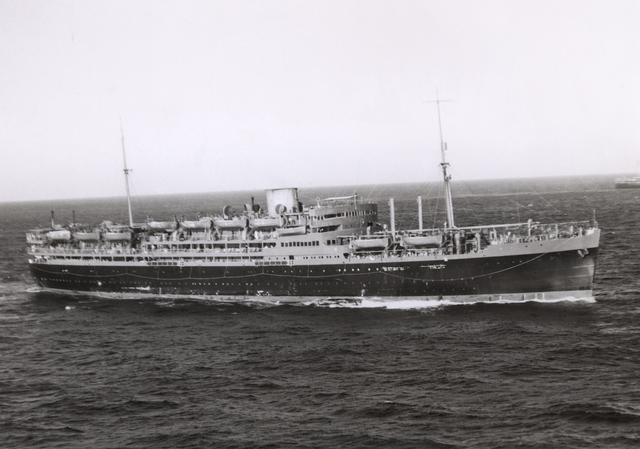September 2020 marked the 80th anniversary of the arrival in Australia of the HMT (Hired Military Transport)  Dunera, dispatched from Britain in 1940, carrying approximately 2,500 so-called “enemy aliens. The Dunera arrived in Port Melbourne on September 3, 1940 – 12 months after World War 2 broke out in 1939 – and most of the “enemy aliens” on board were actually German and Austrian Jewish refugees who had fled from Nazi oppression to Britain in 1938 and 1939, some even earlier. On arrival they were transferred to Hay in NSW where they were interned behind wire, many for up two years.
Dunera, dispatched from Britain in 1940, carrying approximately 2,500 so-called “enemy aliens. The Dunera arrived in Port Melbourne on September 3, 1940 – 12 months after World War 2 broke out in 1939 – and most of the “enemy aliens” on board were actually German and Austrian Jewish refugees who had fled from Nazi oppression to Britain in 1938 and 1939, some even earlier. On arrival they were transferred to Hay in NSW where they were interned behind wire, many for up two years.
The Dunera story illustrates the unjust, irrational and inhumane actions sometimes taken by Governments during War time (and indeed during peace time) when refugees become the targets of inexcusable suspicion and paranoia.
Among the “Dunera Boys”, as they were called, (actually they ranged in age from young to middle-aged men) were 19-year-old Fred Gruen (1921- 1997 ) born in Vienna, Austria and 21-year-old Henry Mayer (1919 – 1991) born in Mannheim, Germany.
Fred Gruen and Henry Mayer chose to remain in Australia after the War as did many of the “Dunera Boys”, contributing significantly to the intellectual, social, cultural and economic life of the nation. Fred Gruen became an economist and was elected to ASSA Fellowship in 1970 and was elected ASSA President 1975-1978. He was awarded an AO in 1986. Henry Mayer became a political scientist and was elected to ASSA Fellowship in 1965 and was awarded an AM in 1980. Henry Mayer made light of the Dunera experience and internment in Hay; like many reflecting on the fate that would have awaited him if he had been trapped in Europe during the Nazi reign of terror and with millions of others sent to Concentration camps as part of the “final solution” .
The Academy connections to the Dunera go beyond remembering two eminent “Dunera Boys” who made their lives in Australia, contributed greatly to their adopted country, and became distinguished Australian citizens and ASSA Fellows.
Many ASSA Fellows have written about the Dunera story. Some Fellows who knew and worked closely with Fred Gruen and Henry Mayer have written about them, some in encyclopedias, dictionaries of biography, and reference books of Australian history and the Australian people. Some have spoken at Dunera Book launches. Some at the celebration of the life of Fred Gruen. The ASSA Fellows who have spoken or written about the lives of Fred Gruen and Henry Mayer or about the Dunera story include Ken Inglis, Frank Bongiorno, Glyn Davis, Max Corden, Murray Goot, Bob Gregory, Bruce Chapman, Peter Karmel, James Jupp, Stuart Macintyre, John Hirst and Graeme Davison.
Ken Inglis (1929-2017) was totally dedicated to the Dunera story. He met a number of the Dunera boys when he was a student residing at Queens College, University of Melbourne in the late 1940s. The Dunera boys and their stories remained with him throughout his academic career and eventually led to two posthumously published books. Dunera Lives: A Visual History (2018) with Ken Inglis the senior author, published to critical acclaim by Monash University Press. Frank Bongiorno performed the Canberra book launch in July 2018.
In Dunera Lives Profiles (2020) also published by Monash University Press, Ken Inglis and his co-authors tell the stories of 20 of the Dunera boys interviewed for the Dunera project at Monash University . Glyn Davis performed the book launch in August 2020.
Max Corden wrote an obituary for Fred Gruen in The Australian, October 31, 1997, reprinted in the ASSA Annual Report 1997. Fellows Bob Gregory, Bruce Chapman, and Peter Karmel spoke at the celebration of the life of Fred Gruen at ANU in November 1997. Murray Goot and Ken inglis wrote the entry for Henry Mayer in the Australian Dictionary of Biography (2014) . Graeme Davison, John Hirst and Stuart Macintyre include an entry about the Dunera in their Oxford Companion to Australian History (1998). James Jupp includes several entries on the Dunera in his monumental The Australian People (2001).
For myself, I remember Fred Gruen as a charismatic, effective and impressive ASSA President, meeting him when I was elected a Fellow in 1975 , the same year as Ken Inglis. I also remember Henry Mayer as an energetic, prolific communicator, constantly questioning and making suggestions, meeting him when I was briefly at the University of Sydney in the early 1970s and later meeting him at Academy meetings. I am continually touched and inspired by the Dunera Story and by the strength and resilience of the men unjustly sent to Australia for internment as enemy aliens, who later bore no lingering resentments and remained to give so much to their chosen new country.
Leon Mann AO FASSA
29 September, 2020



